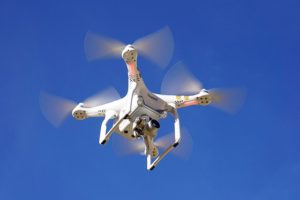While estate planning is essential for everyone, it is even more critical for families with children who have a disability.
Silver Bells and Privacy Rights: What to Know about Pennsylvania’s New Drone Law This Holiday Season
 By John Rafferty — In the last four years, global sales of drones have more than quadrupled. By 2025, drones are expected to sell three times faster than they do now, and 2025 estimates peg the drone industry at $90B. But whether you’re shopping for drones this holiday season or embarking upon a new project with one in 2019, make sure you are up to date on new drone regulations going into effect in just a few weeks, including Pennsylvania’s first set of criminal penalties for the unlawful use of unmanned aircraft.
By John Rafferty — In the last four years, global sales of drones have more than quadrupled. By 2025, drones are expected to sell three times faster than they do now, and 2025 estimates peg the drone industry at $90B. But whether you’re shopping for drones this holiday season or embarking upon a new project with one in 2019, make sure you are up to date on new drone regulations going into effect in just a few weeks, including Pennsylvania’s first set of criminal penalties for the unlawful use of unmanned aircraft.
WHEN A TOY IS NO LONGER A TOY
At just 27 years old, aviation-pioneer Louis Breguet built the earliest version of a quadcopter, that was able to achieve vertical-liftoff of just 2 feet. Suddenly in 2006, even people who grew up flying model airplanes were able to apply for a commercial drone permit from the FAA. Ten years later, DJI’s Phantom 4 leveraged advancements in machine learning and computer vision to enable its drones to avoid obstacles and track people, animals and objects as they move along the ground.
In an age where the photography and real estate industries are leading the purchases of drones with pre-installed HD cameras, treating these tools of industry like toys is no longer an option. Instead, 18 U.S. states have adopted some form of regulation about how drones are to be used within their jurisdictions. In the 32 states without finalized regulations (including Pennsylvania), FAA regulations have governed. That’s all about to change in the Commonwealth on January 12, 2019.
 MUST I REGISTER & CALL AIR-TRAFFIC CONTROL ON CHRISTMAS DAY?
MUST I REGISTER & CALL AIR-TRAFFIC CONTROL ON CHRISTMAS DAY?
First let’s tackle the FAA regulations. Pilots (who must be age 16 or older) with drones from .55-55 lbs. must register at RegisterMyUAS.FAA.gov prior to their first flight. After providing a name, address and email, new pilots are sent a certificate of registration, proof of ownership and a tail-number for their drone.
In addition to requiring immediate registration for any drone between .55 – 55 lbs, the FAA places certain restrictions on where drones may be flown at all. Adhering to the maximum altitude of 400 ft above ground, drones may be flown no-closer-than three nautical miles of a stadium and no-closer than five nautical miles of an airport. If you intend to operate within airspace designated as Class B, C, D or E by the FAA (which encompasses much of the area around Philadelphia), you must first call your local air-traffic control tower and airport operator, or request permission at FAAdronezone.faa.gov. Thankfully, the FAA has also created the B4UFLY app, which is designed to help recreational drone pilots know whether they are in controlled airspace.
NEW CRIMINAL PENALTIES IN PENNSYLVANIA
In October, Pennsylvania Governor Tom Wolf signed Act 78 into law. When it goes into effect on January 12, 2019, drone pilots within the Commonwealth will be subject to criminal penalties, including fines and imprisonment, for using their drones in particular ways.
Specifically, Act 78 (codified in 18 Pa.C.S. § 3505) creates a summary-level offense for drone operators who intentionally or knowingly conduct “surveillance” of another person in a “private place.” Although the Act defines “surveillance” as observing, recording or invading the privacy of another, it seems to leave open the legal argument that surveilling another person in a non-private place is not punishable under the law. The Act indicates that a “private place” is a place where a person has “a reasonable expectation of privacy,” but such a definition creates more questions than it does answers.
If you fly your drone in the airspace above your own property, but look into your neighbor’s backyard, does your neighbor have a reasonable expectation of privacy in that part of his backyard? Would the answer change if you were looking out of your window into the neighbor’s yard, rather than through your drone’s on-board camera? Does the answer change if you look for only a second or two? Does your ability to create a freeze-frame photograph from that one-second look breach your neighbor’s reasonable expectation of privacy? Act 78 doesn’t appear to address these questions, which means that magisterial district justices sitting in district courts across the Commonwealth will be asked to answer these and other questions in the coming months and years.
Drone Tip #1: Until we have greater clarity in the law, encourage your new pilot to err on the side of caution – and assume that any observing or recording by airborne drones could be an infringement of someone’s reasonable expectation of privacy.
AVOIDING MISHAPS & FELONIES AS A NEW DRONE PILOT
Although the new Act is intended to “protect the personal privacy of Pennsylvanians,” it reaches beyond potential privacy infringements. Specifically, the Act also imposes a summary-level offense for using one’s drone in a way that puts another in reasonable fear of bodily injury.
Drone Tip #2: While there’s little clear guidance on how close to a person you can fly without putting that person in fear of bodily injury, fly your drone as far from people as possible.
In addition to the summary-level offense described above, Act 78 also imposes a felony of the second degree for any pilot who delivers, provides, transmits or furnishes contraband to “any convict in a prison, or inmate in a mental hospital” with their drone. Unlike the summary offense, which, according to the new law, carries a maximum penalty of a $300 fine, a felony of the second degree carries a maximum of 10 years in prison and a $25,000 fine.
Drone Tip #3: If you think it might be contraband, don’t transport it to any prison, mental hospital or land related to either institution.
EXCEPTIONS TO THE RULE
As with most laws, certain persons do not incur criminal penalties under the Act if they intentionally or knowingly conduct surveillance of others in a private place. Specifically, law enforcement officers, first-responders (including EMS), and any employee or agent of a government agency that is engaged in the performance of official duties are exempt from criminal penalties. (If law enforcement officers do use drones to conduct surveillance of others in a private place, although criminal penalties would not be appropriate, arguments could be advanced that any information gathered as a result of such surveillance should not be available to the government in a criminal prosecution.) Interestingly, employees or agents of an electric, water, natural gas or other utility are also exempt from such penalties, if they use the drone while engaged in official duties.
For those who are concerned that a nearby drone might be infringing on their reasonable expectation of privacy, shooting the drone down with any projectile is ill-advised. Not only is such an action not protected by Pennsylvania’s new law, but it has the potential to destroy on-board evidence of the privacy violation itself and could subject the shooter to criminal charges, including recklessly endangering another person. Better, would be a photograph or video of the drone’s location and flight path, coupled with a timely call to 9-1-1. Beyond the criminal context, depending on the facts of the particular case, a civil cause of action against the drone pilot might be appropriate.
LITIGATING DRONE LAW CASES
Although Pennsylvania’s appellate courts have not yet had to answer tough questions about how much movement by a drone qualifies as “transmitting” contraband, or when a drone pilot begins to infringe the privacy of another, or whether a drone flew close enough to another to put him or her in reasonable fear of bodily injury, it is only a matter of time before such legal issues will come up for review. With drone sales reaching new heights, judges in the Commonwealth will soon have to make difficult decisions about this emerging area of law.
So whether you’re shopping for the best deals on drones or buying extra batteries and memory cards for the drone you already own, make sure you understand and adhere to the regulations, criminal and civil laws that apply. By erring on the side of not surveilling others and flying far from people, you can avoid unexpected encounters with law enforcement and enjoy a fun, exciting and stress-free holiday season.
John Rafferty is a former Naval Officer, a Fulbright Scholar and works as a Litigation attorney at Gawthrop Greenwood, PC. He can be reached at jrafferty@gawthrop.com or 610-696-8225.



